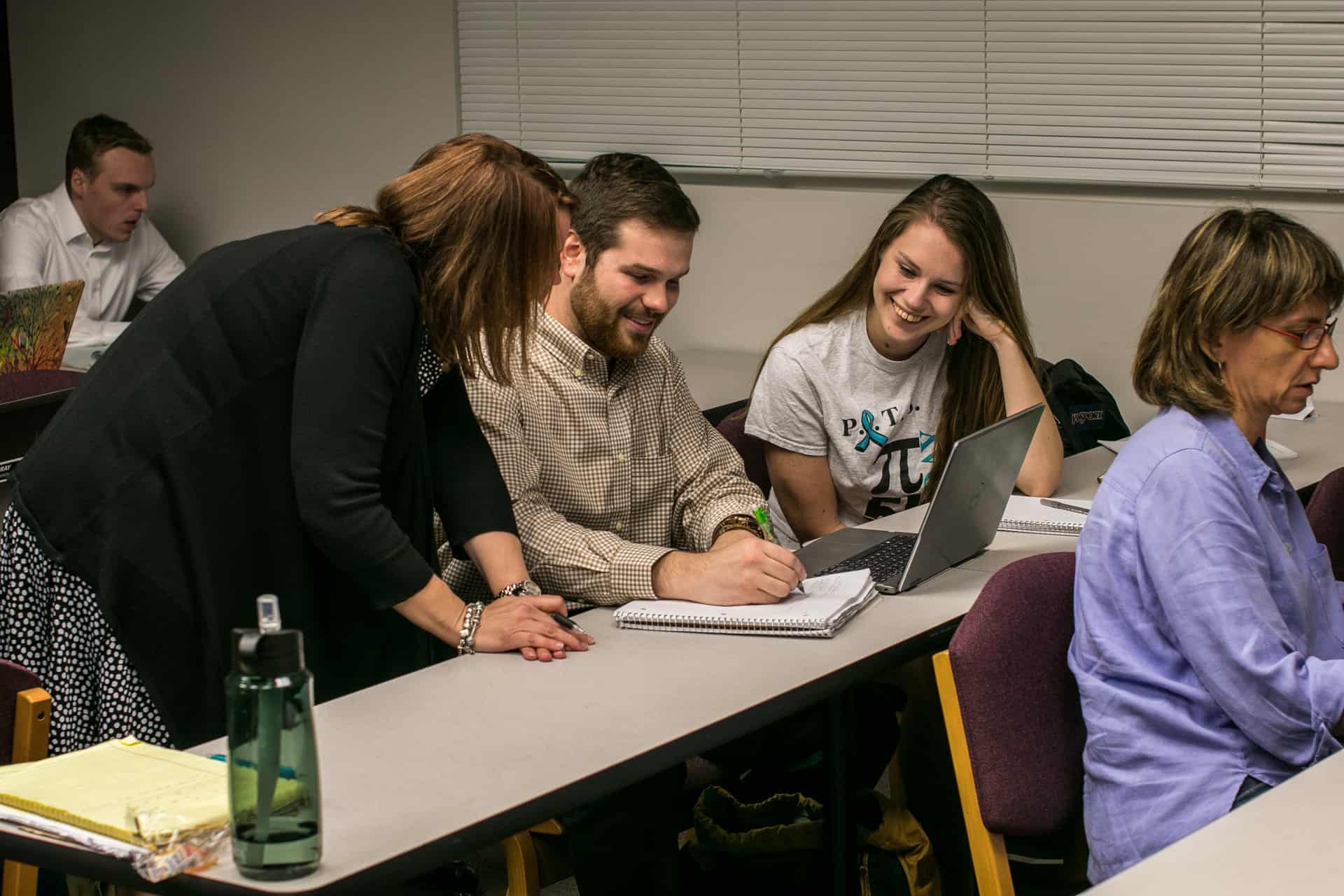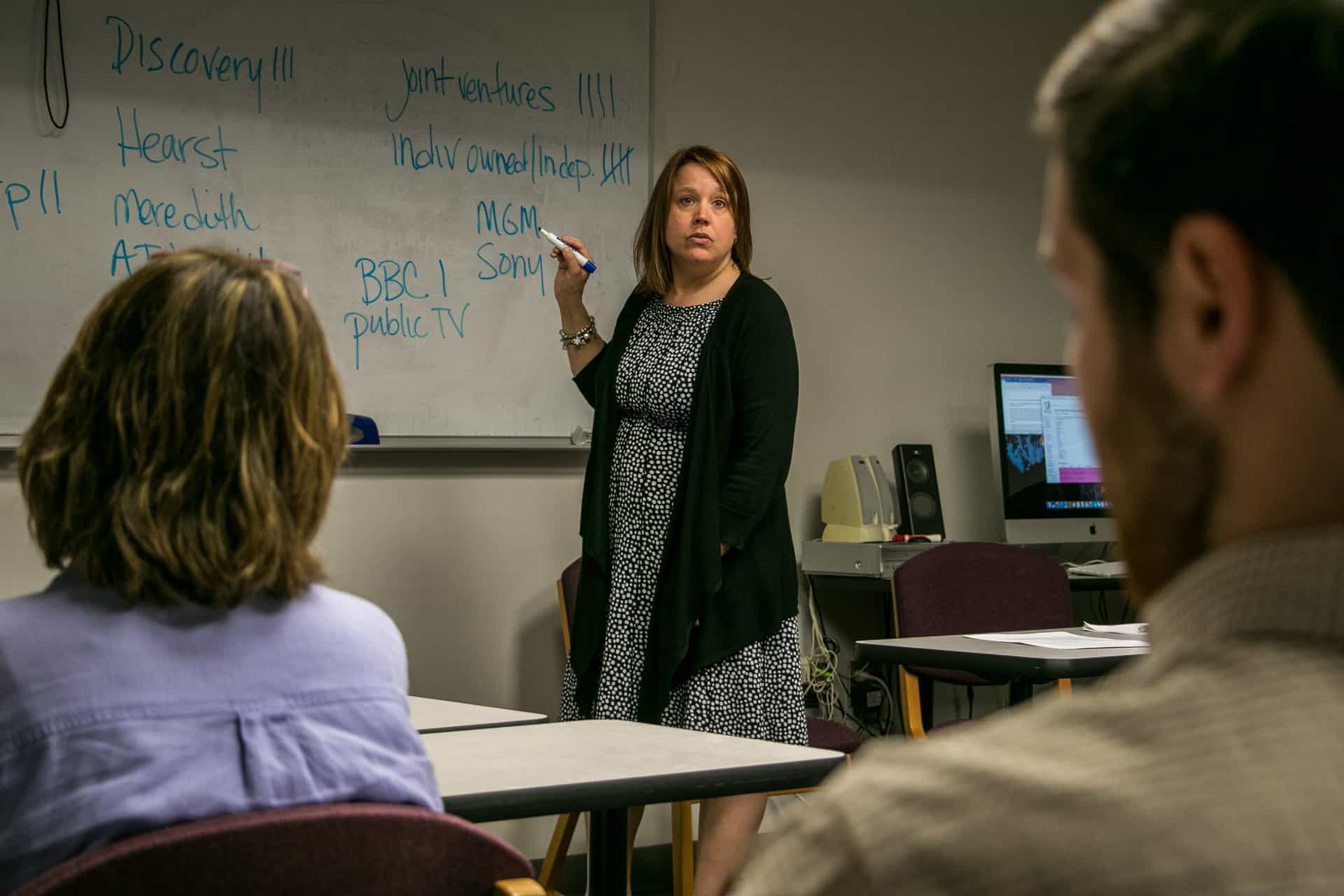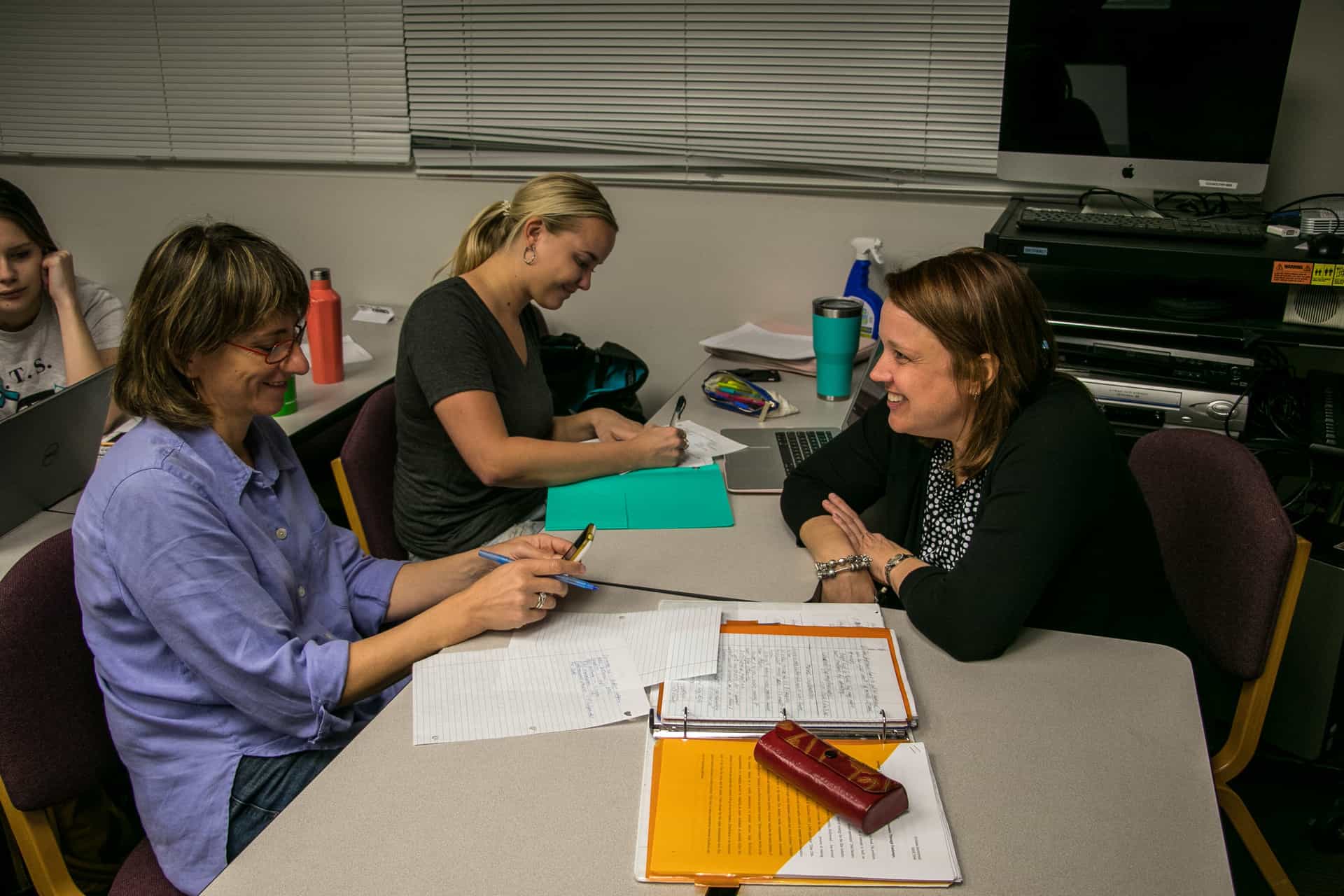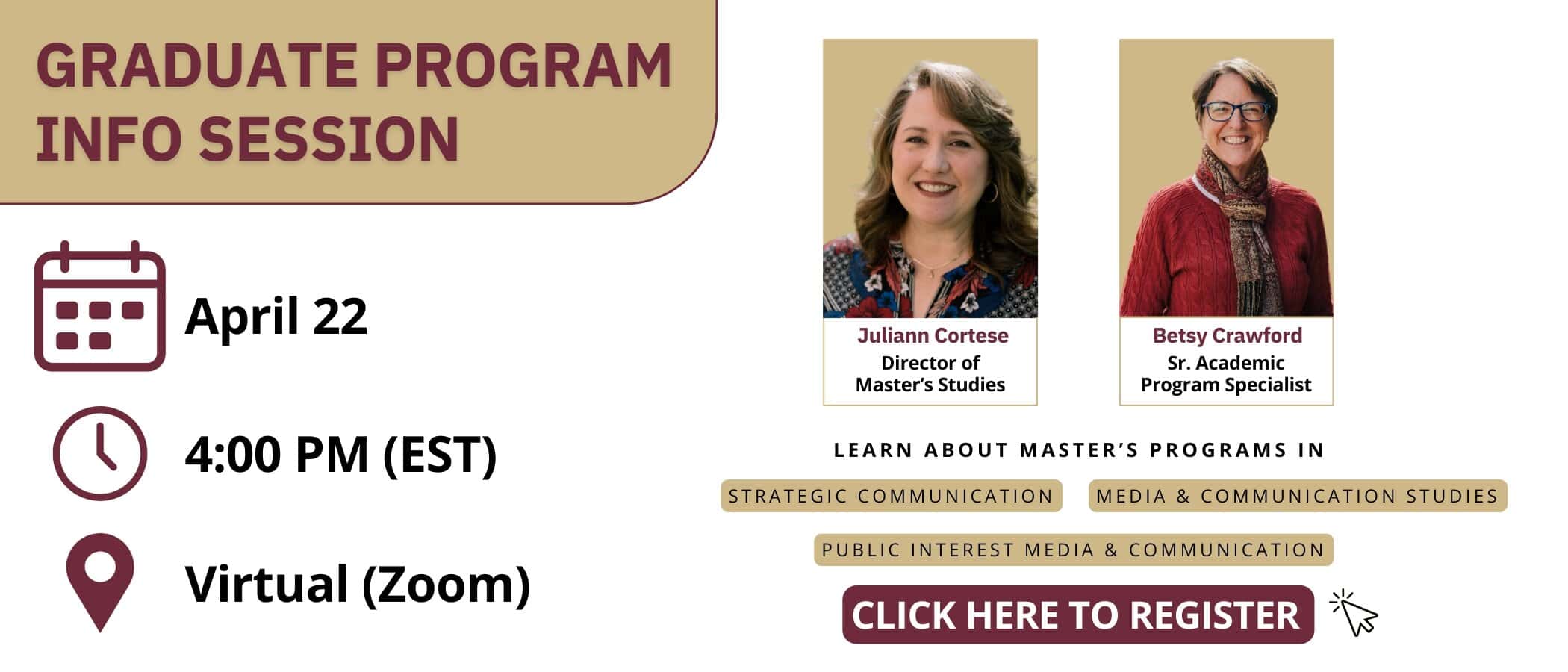Program Information
College: Communication & Information
Degree:
Limited Access: Yes
Contact: Natashia Hinson-Turner, Graduate Coordinator
Address:
School of Communication
Suite 3100, University Center C, FSU
P.O. Box 3062664
Tallahassee, FL USA 32306-2664
Phone: (850)-644-5034
Email: ComGradAdvising@cci.fsu.edu
Connecting, Creating, Growing
A graduate degree in Communication could help to transform your career. The School of Communication’s Media and Communication Studies Master’s Program is designed for graduate students interested in studying communication theory, research, analysis, media content, and media effects. Our program offers two tracks.
- The thesis/creative project track is for students interested in getting involved in discovery through doing their own research. This track is encouraged if the student desires to later pursue a terminal degree in communication.
- The coursework track is for students who want to learn as much as they can about what is going on in the discipline from the research and writings of various scholars in the field.
Both tracks offer theoretical and practical knowledge that can help students begin or shore up a career in communication or communication-related professions. We also offer a School-wide Ph.D. in Communication where students can choose to obtain a terminal degree in their area of interest with the support of highly esteemed and award-winning teaching and research scholars.
Excited by the possibility of becoming a research analyst, project director, station manager, or other communication professional?
Join our progressive faculty and prepare yourself for a variety of careers in the dynamic field of communication with a master’s degree in Media and Communication Studies (MCS).
Related News
FSU SCOM Alumna Jessie Watson Receives MAC Award Celebrating the FSU Credit Union’s Rebrand...

READ MORE
SCOM Alumna Kelly Corder on Advocacy Through Media Relations
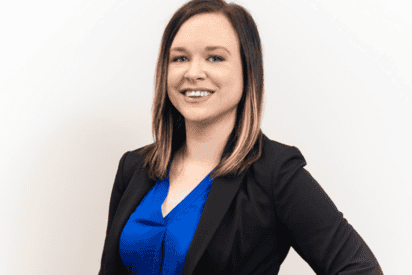
READ MORE
CCI Student Athlete Shares Her Experience Balancing the Best of Both Worlds

READ MORE
Program's Overview
Excited by the possibility of becoming a research analyst, project director, station manager, or other communication professional? Join our progressive faculty and prepare yourself for a variety of careers in the dynamic field of communication with a master’s degree in Media and Communication Studies (MCS).
Program Structure
- Minimum of 33-36 hours of coursework; usually requires 4 semesters to complete
- Creative project, thesis or courses-only option
Program Objective
The Media and Communication Studies program is designed for students interested in studying communication interactions in society, including communication theory, research, analysis, and media content and effects. Check out the MCS Courses page to find out more out courses and Sample Program of Study to view a sample program. Upon completion of the program, students obtain a Master’s in Communication.
Career Opportunities
The program prepares students for positions in media, communication agencies, or other political, social, and public sector organizations. The program also serves as preparation for doctoral work in communication, leading to a teaching or research position.
Benefits and Skills
Introduction to theory, research methods, history, and contemporary social issues pertaining to the following:
- Human communication, such as social interaction and gender studies
- Political communication, rhetoric, and persuasion
- Mass media criticism, policy, processes, and effects
- Application of theories of communication studies, rhetoric, and mass communication, using various research methods
- Analysis of content and effects of traditional and new media
- Development of tools for analyzing communication campaigns: political, public, and advocacy
- Creation of digital media
Request Information
Program's Courses
Courses in the Media and Communication Studies program are broken into Foundation Courses, Concentration Courses, Cognate Courses and a Capstone Experience. The program consists of 33-36 credit hours taken over two years: 33 credit hours for a program that includes a capstone experience and 36 credit hours for the courses-only option. Courses are designed to prepare students for a variety of careers in the dynamic field of communication.
The following course list is meant to give a general overview of the program. A specific plan based on student interest will be developed with an advisor after admission to the program.Students may choose to focus their program based on their personal area of interest. For an example of a typical student course load during the program, please see the sample program.
Foundation Courses
All students must take Analysis of Communication Theory (COM 5401) and then choose one of the following research courses:
- COM 5312 — Communication Research Methods
- COM 5348 — Qualitative Methods
- COM 5340 — Historical Critical Methods
- SPC 6236 — Contemporary Rhetorical Theory & Criticism
Concentration Courses
(Choose 4-5 courses)
Although most concentration courses will come from this list, it is not a comprehensive list of all courses offered. To see a how a concentration area might be developed, please see the sample program.
- MMC 6469 — Communication and Change: Diffusion of Innovations
- RTV 5702 — Communication Regulation and Policy
- RTV 5325 — Documentary Video Production
- COM 5364 — Foundations of Digital Media
- COM 6015 — Gender and Communication
- COM 5340 — Historical-Critical Methods
- MMC 5600 — Mass Communication Theory and Effects
- COM 5426 — Media, Culture, and the Environment
- RTV 5253 — New Communication Technology Theory and Research
- COM 5546 — Political Communication
- COM5646 — Political Economy of Media
- SPC 6236 — Rhetorical Theory & Criticism
- COM 5348 — Qualitative Research Methods
- COM 5545 — Studies in Persuasion
- MMC 5305 — Systems of Mass Communication
- SPC 6306 — Topics in Interpersonal Communication
Please see the Graduate Bulletin for specific course descriptions.
Cognate/Minor Area
(9 hours)
Students are required to pursue a cognate or minor area that relates to or enhances their program. Students are strongly encouraged to explore areas in departments across the university. Possible areas from which to select cognate courses include the following:
- African Studies
- Studies in Aging
- American Studies
- Asian Studies
- Classical Greek Studies
- Criminology & Criminal Justice
- Digital Video Production Certificate
- Educational psychology/research
- English
- Gender Studies
- Geography & World Systems
- Hispanic Marketing Communication Certificate
- Information Science
- Integrated Marketing Communication
- International Affairs
- Peace & Conflict Studies
- Political Economy
- Political Science
- Psychology
- Religious Studies
- Social Psychology
- Sociology of the Family
- Theater Studies
Capstone Experience
Students select one of three options to complete the master’s program: Capstone Creative Project, Thesis or Courses-Only Option.
Capstone Creative Project
This creative project should represent a student’s complete mastery of the skills and knowledge covered in his or her program of studies.
Sample Creative Projects:
Some examples can include but aren’t limited to:
- The student may choose to produce, direct, and edit a documentary video.
- The student may choose to produce, write, and direct one or more episodes of a news or public affairs program.
- A student who has expertise in web design may create a website.
- The student may develop a marketing and communication campaign (must include design elements).
- The student may write a screenplay or adaptation of a novel.
- The student may create a script for a theater performance.
For more information, download the guidelines here.
Thesis
The goal of a master’s thesis is to add to our general knowledge about communication. This goal can be reached in two ways: (1) conducting research, providing analysis or offering critical evaluation of an original topic; or (2) replicating previous research, providing a fresh analysis, or offering a new critical evaluation of a topic in light of recent developments in communication scholarship. The thesis option is highly recommended for those who intend to pursue advanced graduate studies.
Courses-Only Option
In place of the capstone experience, students may complete additional coursework in the MCS area.
Certificate Programs
Students are encouraged to consider the following certificate programs:
Admissions
Graduate Admissions
Application Deadlines
The admissions deadlines are as follows:
- Fall admission -- July 1
- Spring admission -- November 1
- Summer admission -- March 1
- Doctoral program -- December 15
Application Requirements
All applicants for master's and doctoral programs in FSU's School of Communication must satisfy university requirements as well as departmental requirements.
Florida State University Graduate Admission Requirements
- Complete and submit the University Admissions Office's Online Application Form.
- Pay a non-refundable application fee of $30. Application packets will not be reviewed until the fee has been paid.
- Submit a completed Residency Affidavit. All applicants must submit this form, which is completed online.
- Arrange for an official transcript from each college or university attended to be sent to the Office of Admissions. Transcripts may be sent digitally, but must come directly from the institutions attended. An unofficial transcript may be uploaded for the School of Communication for review.
School of Communication Graduate Admission Requirements
In addition to the university requirements listed above, all Communication graduate program applicants must meet the School of Communication requirements listed below. You do not need to submit a separate School application; your university application specifies a program within the School of Communication to which you are applying. Admission is competitive; meeting the following requirements does not guarantee admission, only consideration.- An excellent undergraduate academic record, from accredited universities, to include a minimum 3.0 GPA (on a 4.0 scale). In addition, doctoral applicants should have a minimum of a 3.3 in their master's degree work.
- Three letters of recommendation.
- A personal statement to be evaluated for its clarity of expression, creativity and persuasiveness in arguing that (1) the applicant has the necessary record of preparation and performance to succeed in the program; (2) the applicant’s goals can be served by the program’s courses and experiences; (3) the program itself can benefit significantly from the applicant’s talent and experiences; and (4) the applicant will enrich the diversity of students in his or her program. In making these arguments, please address the following questions specifically:
- What are your career goals; that is, what do you plan to be doing in five years and in 10 years?
- Why have you chosen to apply to our master's or doctoral program?
- What experiences and competencies make you a strong candidate for our program (research skills, computer literacy, teaching experience, awards, etc.)?
- A resume or writing sample (optional for master's students; required for doctoral students).
Additional requirements for international students:
- Provide proof of proficiency in both spoken and written English language: An international applicant whose native language is not English, or who has not completed a degree at an English-language university, must have taken the TOEFL (Test of English as a Foreign Language) exam (or FSU Graduate School approved alternative test) within the past five years. The Educational Testing Service administers this test. For more information: ets.org/toefl
- Provide Certification of Financial Responsibility. This required form may be downloaded online or requested from the university. NOTE: The completed CFR is submitted to the International Center. Instructions and address are on the form.
Need more information?
Questions about School Admission Requirements:
Natashia Hinson-Turner, Graduate Coordinator School of Communication ComGradAdvising@cci.fsu.edu 850-644-5034 Suite 3100, University Center C, FSU P.O. Box 3062664 Tallahassee, FL USA 32306-2664Questions about University Admissions Requirements:
Office of Admissions The Florida State University P.O. Box 3062400 Tallahassee, FL USA 32306-2400 admissions.fsu.edu graduateadmissions@admin.fsu.edu 850-644-6200Questions about Communication Graduate Programs:
Betsy Crawford, Graduate Recruiter College of Communication & Information Betsy.Crawford@cci.fsu.edu 850-645-9661Questions about Doctoral Programs:
Arienne Ferchaud, Director of Doctoral Studies College of Communication & Information arienne.ferchaud@cci.fsu.edu 850-644-5034Program's Faculty
Bunz, Ulla
Associate Professor, Associate Dean for Student & Academic Affairs
Houck, Davis
Fannie Lou Hamer Professor of Rhetorical Studies
Proffitt, Jennifer
Theodore Clevenger Professor in Communication
FAQ
Can I earn the degree completely online?
Our Strategic Communication Master’s Program is offered completely online or on campus. All others are only offered on campus.
Do I have to take the GRE and what are the required scores?
No, the GRE is not required for admission to the School of Communication graduate programs.
What English language proficiency tests do you accept and what are the required scores?
The School of Communication accepts the following tests and minimum scores.
| TOEFL | IELTS | Cambridge English Scale | Michigan Assessment Level | Duolingo |
| 5 | 7 | 190 | 72 | 130 |
How much does it cost?
For up-to-date costs, please see the FSU Tuition & Fees page, https://studentbusiness.fsu.edu/tuition-fees
Do you offer assistantships/funding?
The School of Communication offers several assistantships to graduate students in the fall, spring and summer semesters. For more information about assistantships, please visit: https://comm.cci.fsu.edu/about-the-school/financial-aid/assistantships/
How long to complete the program?
We recommend students take three classes each semester (9 credit hours). Our programs require 33 – 36 credit hours depending on the chosen capstone project (PIMC requires 36 for all capstone options). Following these guidelines, a student can finish their program in 4 semesters.
What are the capstone options and do I have to write a thesis?
In PIMC the capstone options are courses-only, creative project, or thesis (all options require 36 credit hours). In MCS, capstone options are courses-only (36 credit hours), creative project (33 credit hours), or thesis (33 credit hours). In IMC, capstone options are courses-only (36 credit hours), residency (33 credit hours), creative project (33 credit hours), or thesis (33 credit hours).
What is the difference between an MA and MS?
Students who received a BA degree also qualify for the MA degree so you have the option to select the MS or MA degree.
Students who received a BS degree will need to take additional language courses to qualify for a MA, but qualify for a MS degree without taking any additional courses.
Please see below the BULLETIN’s description of the Master of Arts requirements.
Graduate Bulletin:
“In addition to the requirements for the MS, candidates for the Master of arts degree must meet the following requirements.
- Proficiency in a foreign language demonstrated by certification by the appropriate language department, or completion of twelve (12) semester hours in a foreign language with an average grade of at least 3.0 (“B”), or four years of a single language in high school.
- Six (6) or more semester hours of graduate credit in one or more of the following fields: art; classical language, literature, and civilization; communication; (not to include speech correction); english; history; humanities; modern languages and linguistics; music; philosophy; religion; and theatre.”
Who should write my letters of recommendation?
The best letters of recommendation are written by instructors with whom you have had one or more classes. Choose someone who knows you and your work well and who can honestly speak of your strengths.
I was not a Communication major do I need to take prerequisites?
No, we do not require prerequisites to starting the major area of study for our graduate programs.
Can I have the application fee waived?
No, the application fee of $30 cannot be waived.


